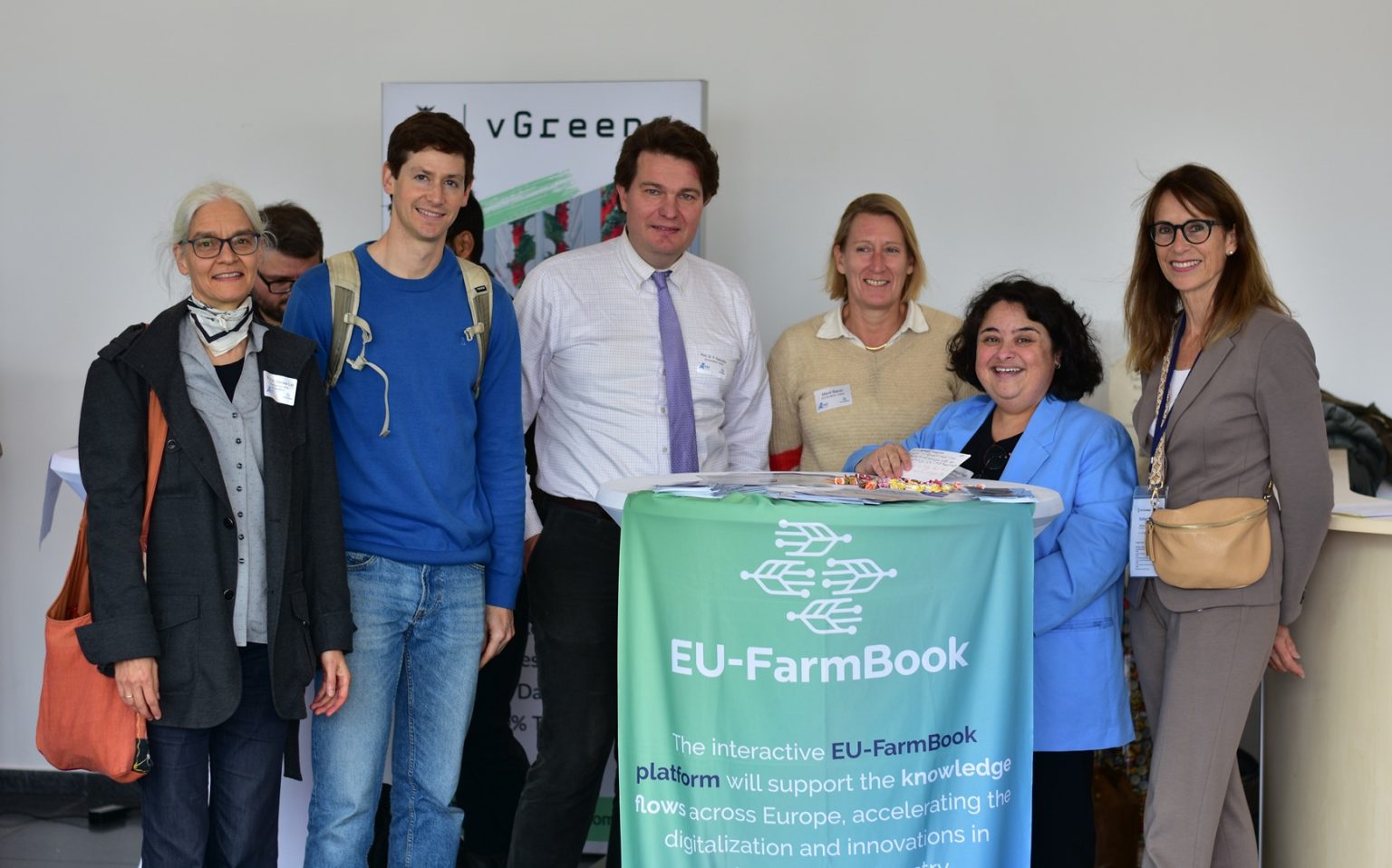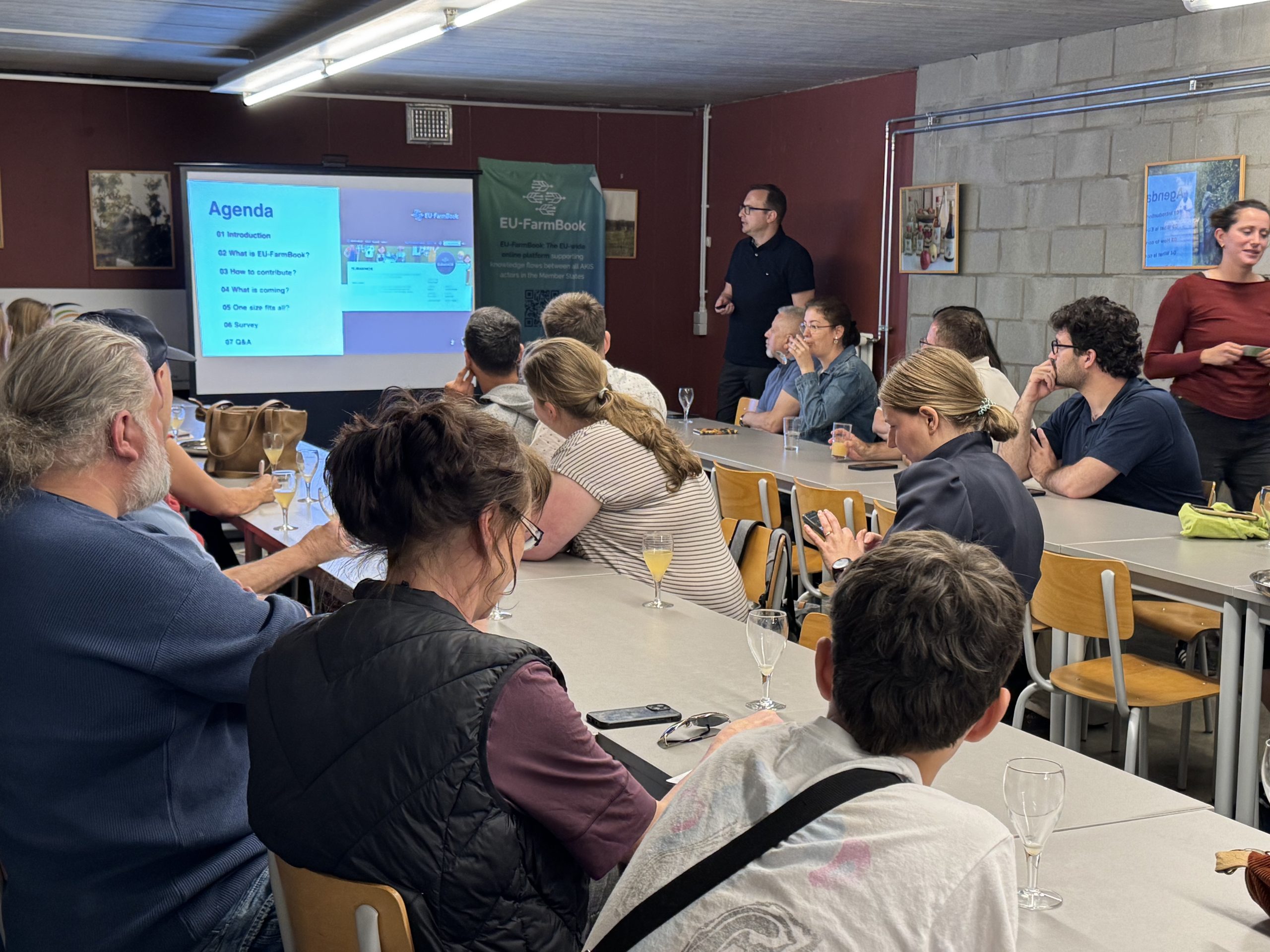Advancing AKIS Synergies: EU-FarmBook at Horizon Project Clustering Meeting in Brussels
From June 26 to 27, the European Research Executive Agency (REA) and DG AGRI hosted the Clustering Meeting of Horizon-funded thematic and advisory networks and AKIS-related projects in Brussels. “The event brought together around 25 Horizon Europe projects. These Thematic Networks, Advisory Networks and AKIS support projects shared good practices and discussed strategies to strengthen the Agricultural Knowledge and Innovation System (AKIS) across Europe.
Among the key contributors was EU-FarmBook, the digital platform designed to centralize and disseminate practice-oriented knowledge in agriculture and forestry. During the session on Advancing AKIS Synergies, Inge De Bo, Scientific Coordinator from Ghent University, presented the latest developments of the platform, underlining its role in bridging the gap between research and practice.
“We aim to provide a trustworthy, multilingual point of reference for farmers, foresters, and advisors to meet and share knowledge in agriculture, forestry and rural business,” said De Bo. “EU-FarmBook is more than a repository – it’s an ecosystem that supports knowledge flow and long-term visibility for project results.”
Tackling Common Dissemination Challenges
Throughout the two-day meeting, project coordinators highlighted common challenges in reaching practitioners, including language barriers, using the most appropriate communication channels for the various user groups and the short lifespan of project websites. The EU-FarmBook platform directly addresses these issues by offering:
- Easy search functions by topic and project
- An AI-powered Farm Assistant chatbot
- Dedicated, multilingual project pages
- Integration with national and sectoral platforms via API
These tools help ensure that project outputs remain accessible and usable after a projects’ official end. Examples presented during the meeting—including the Romanian Operational Group page and NUTRI-KNOW’s content stream demonstrated how projects are already benefitting from EU-FarmBook integration. Thanks to the EU-FarmBook API, the outputs of the ResAllience project published on EU-FarmBook can also be accessed seamlessly and directly from the project website.
Over the course of the meeting, project coordinators shared best practices and recommendations on how to improve the dissemination and exploitation of project results. Eduard Mauri, from the European Forest Institute, coordinator of ResAlliance thematic network, and EU-FarmBook Ambassador, overall key takeaways from the meeting were that multilingualism is one of the biggest barriers when targeting practitioners, that there is no need to create more platforms, instead existing and trusted platforms should be used and he emphasized the importance of collaboration, knowledge exchange, and a user-centered approach to dissemination. Mauri said, that projects should plan early on how their outputs will be stored and accessed in the long term — ideally already in the first version of their Data Management Plan. This helps ensure that outputs and metadata are prepared for future archiving in existing platforms.
Supporting Innovation Through Collaboration
Thematic and Advisory Network projects shared insights on living labs to foster co-creation with users, leveraging… micro-credentials to increase engagement with advisors, conducting cost-benefit analyses of innovative practices and allowing flexibility in KPIs to support multi-actor project approaches. Participants also called on the European Commission to make clustering meetings an annual event and to continue further support of cross-project collaboration and knowledge exchange.
EU-FarmBook’s Role Going Forward
EU-FarmBook’s engagement went beyond presenting the platform updates. Alongside sister projects PREMIERE and ATTRACTISS, the team co-led a workshop titled “Turning Innovation into Impact: Delivering High-Quality Practice-Oriented Outputs.”
The first break-out session, led with by Robby Cloesen from Boerenbond, explored what makes a knowledge object truly valuable for practice. Participants passionately advocated for offering content in multiple engaging formats—like videos, podcasts, and visual factsheets—to meet the real needs of farmers, advisors, and educators. They emphasised the value of clear, user-friendly communication, calling for multilingual accessibility and licensing that encourages reuse. There was a strong push for involving practitioners in the review process to ensure outputs are not only accurate but also genuinely useful. The other workshop groups reflected about the use of current and of future-oriented dissemination channels. “We will always need well-targeted dissemination strategies for the different target groups. The EU-FarmBook platform in a promising instrument to spread the innovative solutions of EU-funded Research and Innovation projects.” said Lisa van Dijk, representing both EU-FarmBook and PREMIERE. The sessions radiated a shared commitment to creating knowledge that connects, inspires, and makes a difference on the ground.
“Let the knowledge flow,” was the call to action shared during the final session. With its inclusive design, long-term hosting model, and collaborative integration with national and regional platforms, EU-FarmBook is set to become the cornerstone of AKIS-related knowledge exchange in the EU.
For more information or to contribute to the platform, visit: https://eufarmbook.eu or contact your national EU-FarmBook ambassador.



